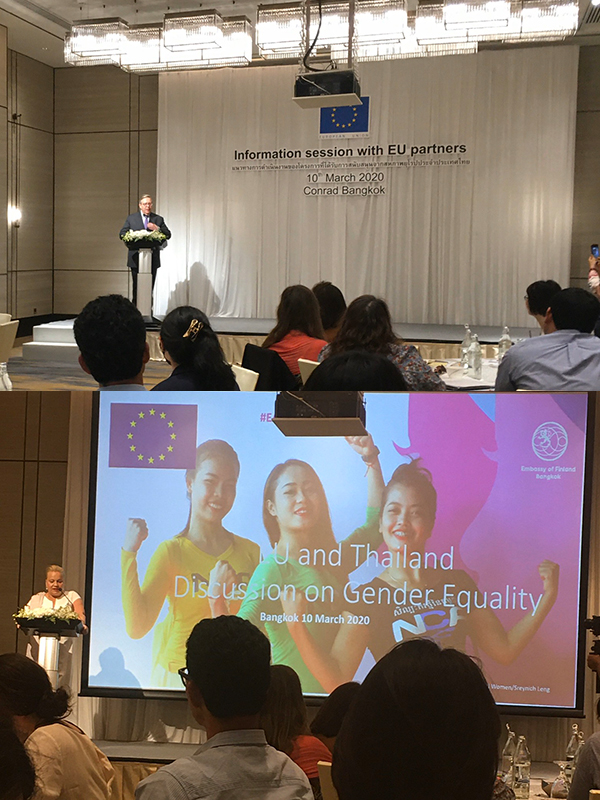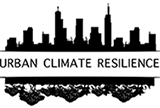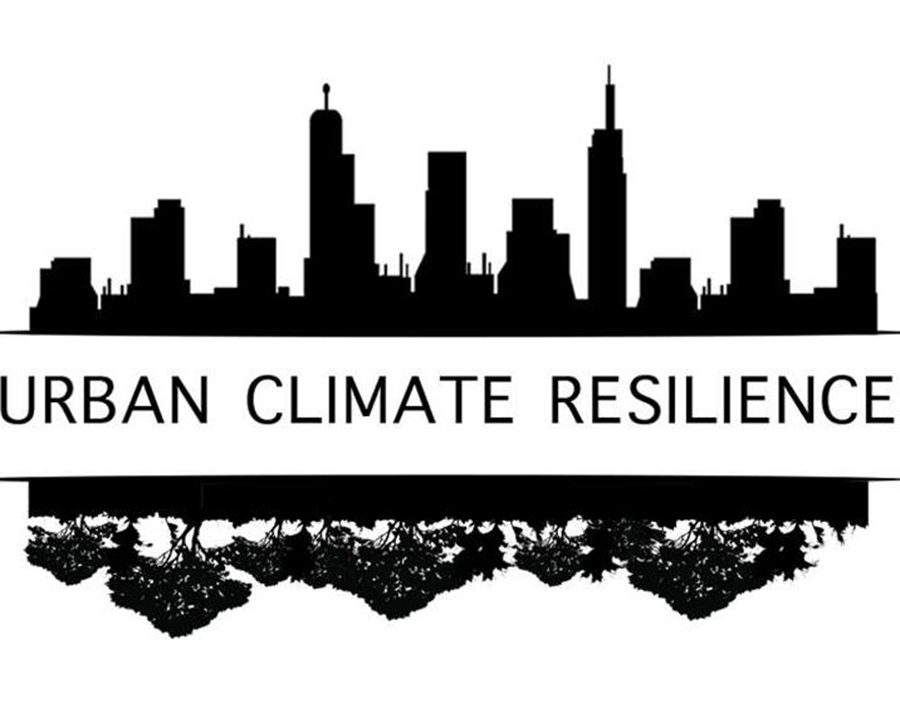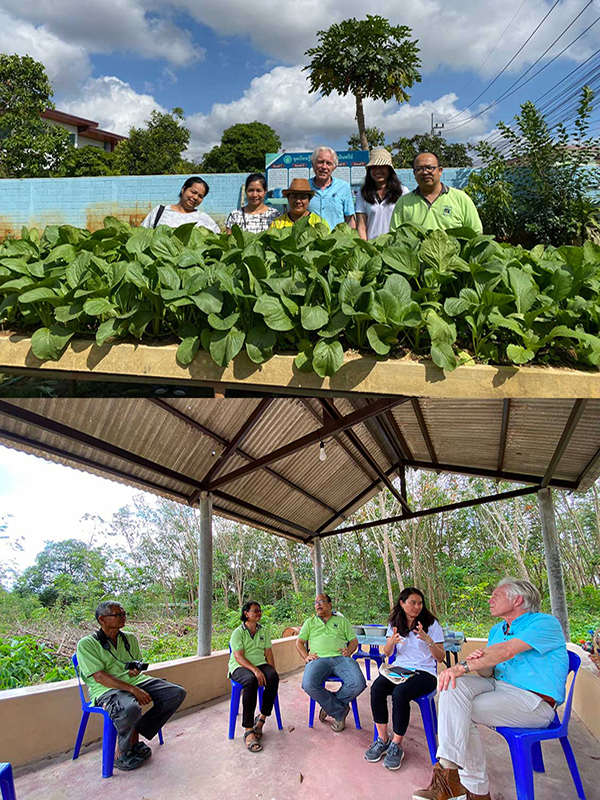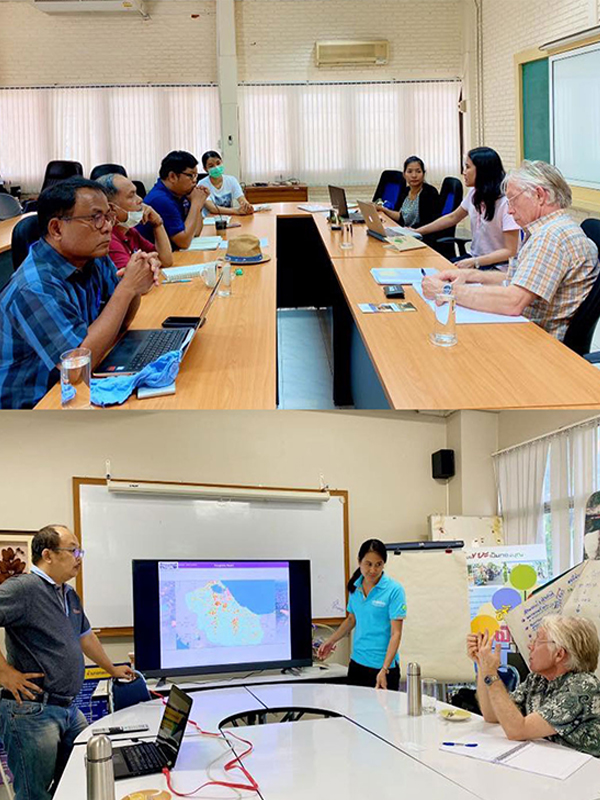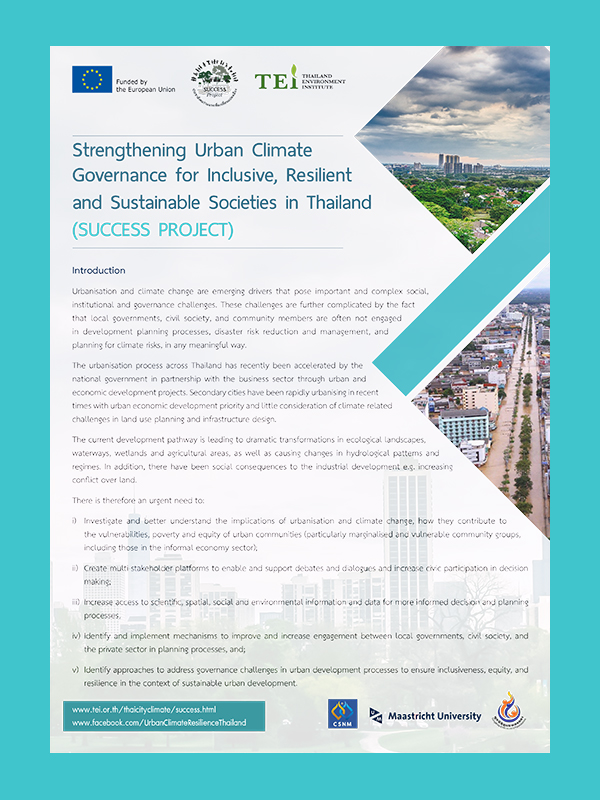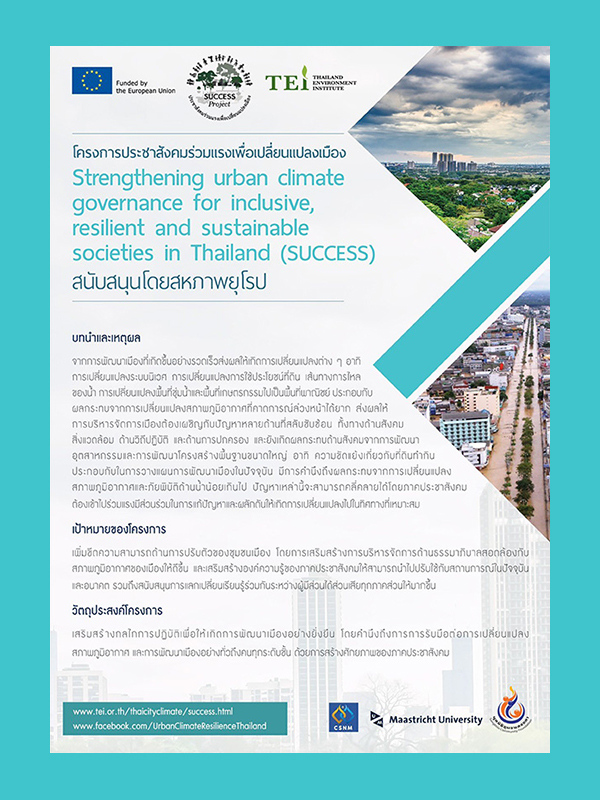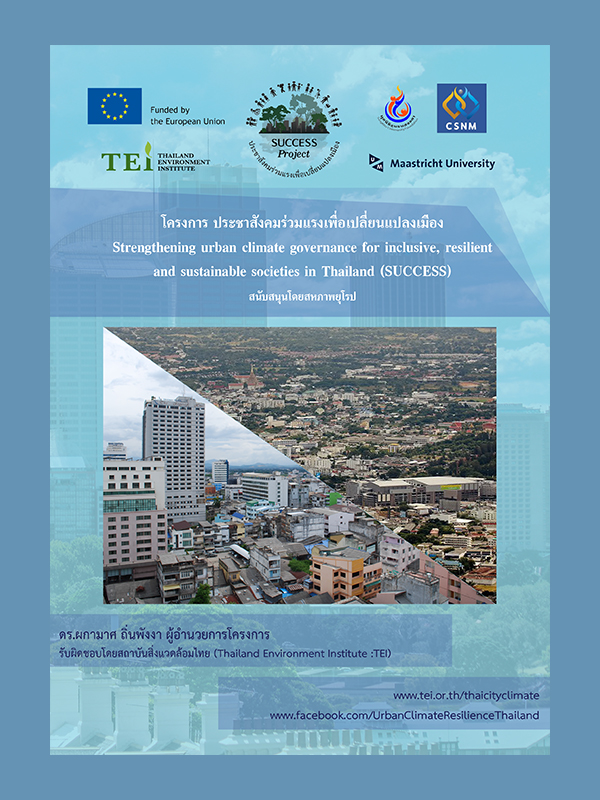Story
STORY
URBAN CLIMATE RESILIENCE
Goal
City, community and society in Thailand will be able to cope better and efficiently with climate change
Objectives
To strengthen climate change resilience preparedness of the cities in Thailand in the long term by considering changes and development according to the city’s context and to push forward climate change proposals into the city and country-level policy
Main activities
Apply climate change resilience concept to network cities
Develop knowledge and extend distilled lessons on good practices and push it forward to the Research Agenda
Collaborate with stakeholders involved in policy at all levels for promoting knowledge, lessons and practices into policy level
Expected Outcomes
Community, city and society are equipped with knowledge and awareness of climate change resilience preparedness
Climate change resilience issue is integrated to the city development plan and it can be used in compliance with the facts and the city development tendency and climate change in the future
Stakeholders involved in policy at all levels give importance to and participate in climate change resilience preparedness
Urban Climate Resilience Programme in Thailand under Thailand Environment Institute’s responsibility consists of 2 projects: 1) Asian Cities Climate Change Resilience Network Project (ACCCRN) and 2) Mekong-Building Climate Resilient Asian Cities (M-BRACE)
Asian Cities Climate Change Resilience Network Project (ACCCRN)
The project, supported by the Rockefeller Foundation, has been conducted in 4 countries in Asia: India, Vietnam, Indonesia and Thailand. The objective is to enhance climate change resilience preparedness by collaborating with the network focusing on building potentials, awareness, and cooperation among members at city and country levels. For Thailand, the operation is divided into 4 stages (2009-2016).
Picture showing the stages of ACCCRN’s operation
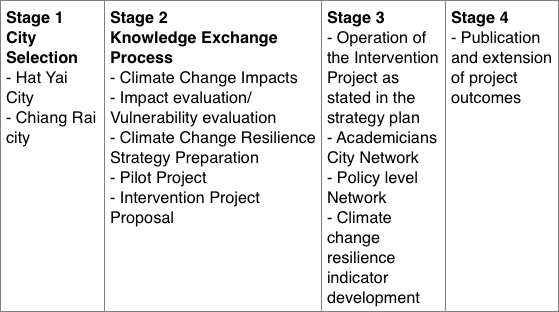
Stage 1: City Selection, Cities which were selected are Hat Yai and Chiang Rai (2009)
Stage 2: City Engagement and Capacity Development through Shared Learning Dialogues: SLDs
Stage 3: Projects Implementation as developed in Stage 2: building the city network, academician network and the network of stakeholders involved in policy at city and country levels and increasing other related potentials such as climate change resilience indicator development (2011-2014)
Stage 4: Dissemination and Scaling Up through networks and pushing forward to policy at city and country levels, distilled lessons, knowledge and best practices through different types of publication such as academic articles, book/manual etc.(2013 – 2016)
Hat Yai City
Hat Yai is the center of economy and transportation and important link between countries of the South. The city has been developed rapidly, especially infrastructure and construction development. However, the results of the development is construction blocking the water flow, catchment or drainage area intrusion, in addition to physical characteristics of the U-Tapao watershed lowland, which will cause repetitive floods and economic area and community damage. This problem is considered the most important and will increase violence when the city faces climate change situations. Therefore, in order to enhance resilience, the following operations have been conducted:
The (Pilot) Project The U-Tapao watershed Flood Management Network (Feb-Jul 11) for developing the manual and community-level flood prevention database system
The Project for preparing quality of life development plan and community plan for climate change resilience and adaptability in Hat Yai area (Jan 12 – Apr 14) in order that people are aware of, able to adapt and self-reliant and have a choice of making a living while facing the flood.
The Project for enhancing Hat Yai flood resilience and adaptability during the long term (Dec 12-Nov 15) for building the network, awareness and community/concerned sector participation, which will lead to climate change resilience enhancement and increase continuously resilience potentials in the future.
The Project for developing collaboration and participation between public and business sectors for Hat Yai flood resilience in the long term (Nov 13 – Apr 15) and collaboration between public and private sectors in developing further the policy and integrate reduced risks from flood plan
Chiang Rai City
Chiang Rai is the important center of commerce and tourism in the North under the “Economic Quadrangle” Project, which will increase the economic and social growth and public utility development to serve more needs. When combined with increased climate change problems, Chiang Rai will be in the risk condition from these impacts. In order to prepare climate change resilience, these following operations have been conducted:
The (Pilot) Project of the city area development for climate change resilience (Feb-Jul 11) for preserving biological diversity in the Nong Pueng area, increasing green areas in the city. Moreover, people can use it for their living and it can be used as water retention area in flood season.
The Project of ecological system restoration and local culture development in the Kok noi River area (Jan 12-Dec 12) for increasing green public areas, which will develop collaboration between local organizations and community.
The Project of resilience plan and economic plan development under the climate change context (Jan 13 – Dec 14) by aiming at enhancing potentials of all sectors of Chiang Rai for climate change resilience preparedness
Mekong-Building Climate Resilient Asian Cities (M-BRACE)
United States Agency for International Development-USAID is making efforts in developing climate change adaptability in different cities in Asia by granting the budget to ISET (Institute for Social and Environmental Transition), operated by “Mekong-Building Climate Resilient Asian Cities: M-BRACE)” project in 2 countries: Vietnam and Thailand.
For the M-BRACE operation in Thailand, ISET has collaborated with Thailand Environment Institution. The activities have been conducted in Phuket and Udon Thani (2011-2014)
Goal
Cities in South-East Asia can cope with climate change
Objectives
To develop potentials, knowledge and understanding related to climate change, as well as the risks and the impacts that the city will face and to specify strategy issues concerning climate change impacts which will be included in the strategic plan of the city and implemented.
Operation
Developing collaboration from all sectors which are local administrative organizations, public sectors, civil sector, popular sector, education sector and private development organizations to conduct activities as planned in the project:
Climate Workshop
Shared Learning Dialogues or SLDs
Vulnerability Assessment
Intervention Project
Promoting the strategic plan of climate change resilience into the city level
The Climate Resilience Framework
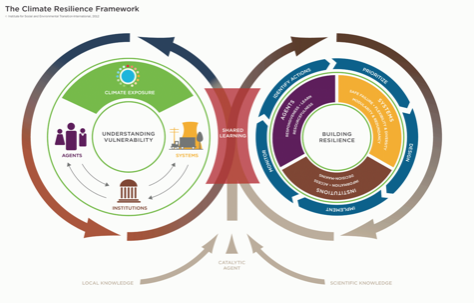
It was developed to be the operation framework for the understanding of climate change resilience. The framework concept consists of 2 parts: Vulnerability Understanding and Resilience. The procedures require important tools 1) Shared Learning, where all sectors will exchange learning by using knowledge and local wisdom as well as scientific knowledge.
Part 1- Vulnerability Understanding, consisting of
2) Urban System – enhancing understanding of relations and systematic links of Agents (person, organization or sector) Systems (infrastructure system and ecological system) and Institutions (Mode of practices, law, policy)
3) Climate Exposure – understand and know what are the climate change impacts that the city must face
4) Understanding Vulnerability – The procedures above (1-3) explain how the city is vulnerable
Part2 Resilience
5) Building Resilience – after understanding the city’s vulnerability, the city’s resilience will be built by ordering problem priority and then conducted with follow-up, verification and evaluation. However, these procedures will be retaken to exchange learning for increasing knowledge and analyzing how much operations conducted are efficient for the city’s resilience.
